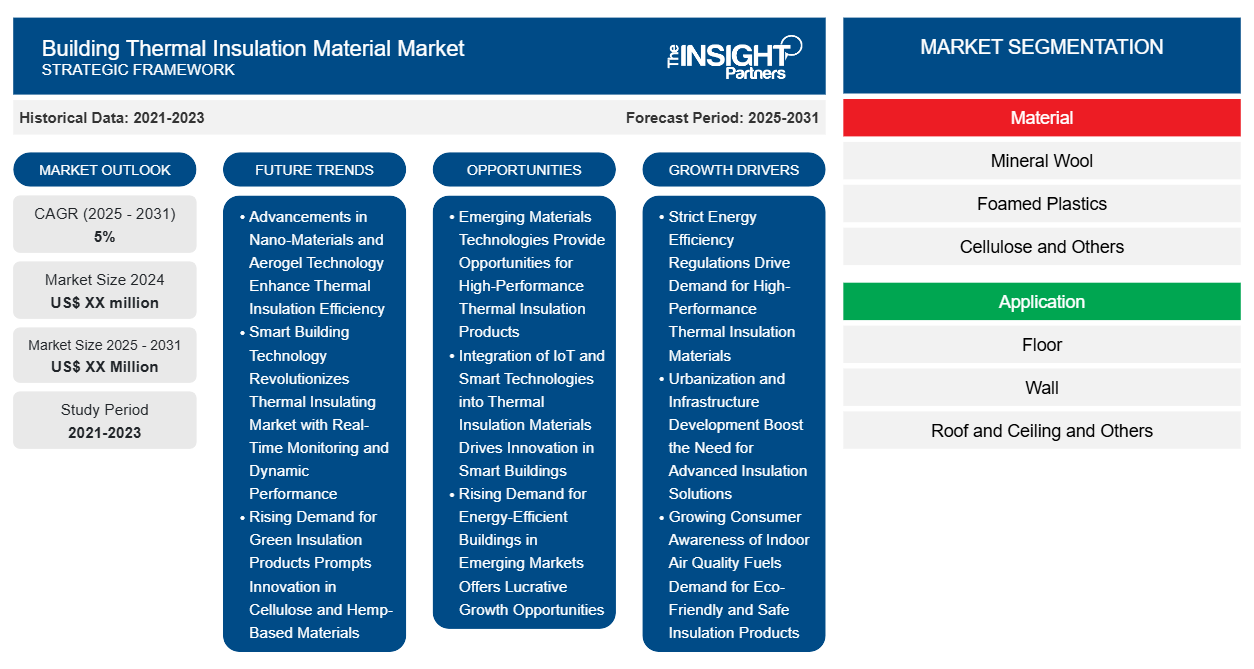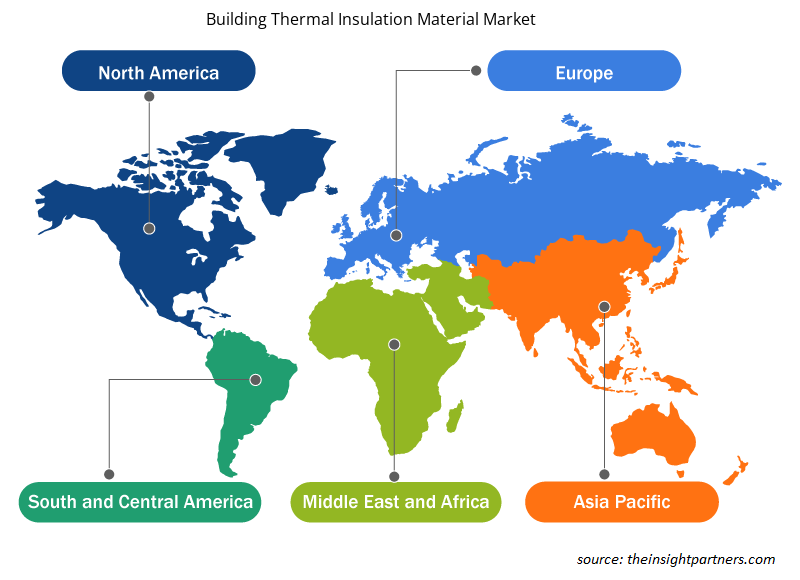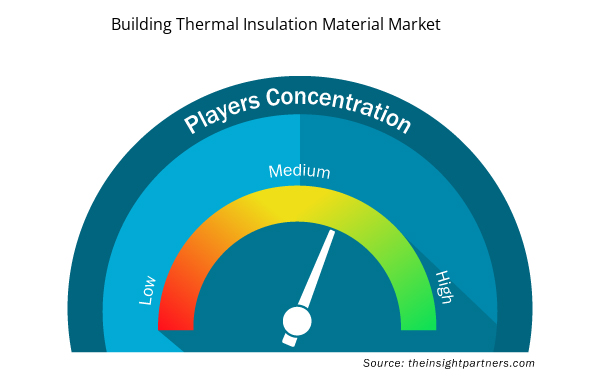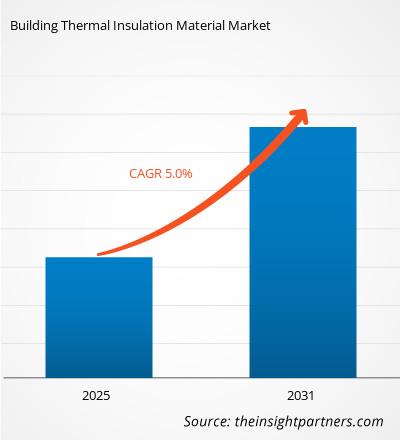The Building Thermal Insulation Material Market is expected to register a CAGR of 5% from 2025 to 2031, with a market size expanding from US$ XX million in 2024 to US$ XX Million by 2031.
The report is segmented by material (mineral wool, foamed plastics, cellulose and others). The report further presents analysis based on application (floor, wall, roof and ceiling and others). Based on end use, the market is segmented into (residential, commercial, industrial and institutional and infrastructure). The global analysis is further broken-down at regional level and major countries. The market size and forecast at global, regional, and country levels for all the key market segments are covered under the scope. The report offers the value in USD for the above analysis and segments. The report provides key statistics on the market status of the key market players and offers market trends and opportunities.
Purpose of the Report
The report Building Thermal Insulation Material Market by The Insight Partners aims to describe the present landscape and future growth, top driving factors, challenges, and opportunities. This will provide insights to various business stakeholders, such as:
- Technology Providers/Manufacturers: To understand the evolving market dynamics and know the potential growth opportunities, enabling them to make informed strategic decisions.
- Investors: To conduct a comprehensive trend analysis regarding the market growth rate, market financial projections, and opportunities that exist across the value chain.
- Regulatory bodies: To regulate policies and police activities in the market with the aim of minimizing abuse, preserving investor trust and confidence, and upholding the integrity and stability of the market.
Building Thermal Insulation Material Market Segmentation
Material
- Mineral Wool
- Foamed Plastics
- Cellulose and Others
Application
- Floor
- Wall
- Roof and Ceiling and Others
End Use
- Residential
- Commercial
- Industrial and Institutional and Infrastructure
Geography
- North America
- Europe
- Asia-Pacific
- South and Central America
- Middle East and Africa
Customize This Report To Suit Your Requirement
You will get customization on any report - free of charge - including parts of this report, or country-level analysis, Excel Data pack, as well as avail great offers and discounts for start-ups & universities
Building Thermal Insulation Material Market: Strategic Insights

- Get Top Key Market Trends of this report.This FREE sample will include data analysis, ranging from market trends to estimates and forecasts.
Building Thermal Insulation Material Market Growth Drivers
- Strict Energy Efficiency Regulations Drive Demand for High-Performance Thermal Insulation Materials: Governments worldwide are adopting strict energy efficiency regulations to reduce carbon footprints and energy use in buildings. As a result of the current focus on greener and more sustainable construction practices, high-performance thermal insulation materials have seen increased demand because thermal insulating materials are an essential component of energy efficiency in residential, commercial, and industrial structures and are favored by builders and architectural designers.
- Urbanization and Infrastructure Development Boost the Need for Advanced Insulation Solutions: The construction industry globally is undergoing robust growth due to urbanization, population growth, and infrastructure development. The construction of new buildings typically means increasing demand for thermal insulation materials, particularly in climates with extreme winter and summer temperature spikes. End users (contractors and builders) also focus on the advanced insulation measures to support energy efficiency, thermal comfort craft, and building code compliance.
- Growing Consumer Awareness of Indoor Air Quality Fuels Demand for Eco-Friendly and Safe Insulation Products: There is an increased awareness among consumers and businesses about the importance of indoor air quality, given that thermal insulation products not only support energy efficiency but, as an intermediary, products work to maintain comfortable indoor conditions to regulate temperature and moisture. Users increasingly demand insulation products that are not toxic, biodegradable or recyclable options that improve indoor air quality, impacting their final selection consideration and purchase decision.
Building Thermal Insulation Material Market Future Trends
- Advancements in Nano-Materials and Aerogel Technology Enhance Thermal Insulation Efficiency: The market for thermal insulating is seeing revolutionary progress in material science, namely the development of nano-materials and aerogel technology, the result of which are smaller, thinner, and more efficient thermal insulating products providing performance that has exceptional thermal performance. With the current push by manufacturers for research and development, the market has witnessed a shift towards high-performance insulation materials that can be efficiently embedded in multiple building systems.
- Smart Building Technology Revolutionizes Thermal Insulating Market with Real-Time Monitoring and Dynamic Performance: With the emergence of smart building technology, the thermal insulating market is transforming. While not pure mechanical insulation, this smart insulating technology with inside sensors allows building owners to monitor the temperature, energy use, and humidity in real time. This infrastructure would allow for dynamic insulation performance and energy use, providing building owners with valuable data to help heat their buildings.
- Rising Demand for Green Insulation Products Prompts Innovation in Cellulose and Hemp-Based Materials: Innovations related to cellulose or hemp insulation products are studied as green products due to rising concerns related adverse impact of building materials on the environment. Key market players are focused on realigning production and delivering on sustainability goals to help with overall environmental sustainability.
Building Thermal Insulation Material Market Opportunities
- Emerging Materials Technologies Provide Opportunities for High-Performance Thermal Insulation Products: Emerging technologies in materials present a prospect for manufacturers to innovate and create higher-performing insulation products. Manufacturers investing in R&D can create insulation materials with improved thermal resistance, fire resistance, and moisture management. This innovation can target specific market segments, such as the passive house sector and the energy-efficient retrofitting of homes that require better insulation.
- Integration of IoT and Smart Technologies into Thermal Insulation Materials Drives Innovation in Smart Buildings: As the adoption of smart buildings continues to expand, there is considerable opportunity for manufacturers in the thermal insulation market to integrate smart technologies. Manufacturing insulation materials that utilize IoT technology can offer insulation materials that track and report energy performance and indoor conditions in real time.
- Rising Demand for Energy-Efficient Buildings in Emerging Markets Offers Lucrative Growth Opportunities: The thermal insulation market also presents considerable opportunities for growth in emerging economies. As urbanization and economic development increases in emerging markets, such as Asia-Pacific, Latin America, and Africa, the demand for energy-efficient buildings is expected to increase. Manufacturers can tap this lucrative opportunity of tapping into the emerging markets by adapting their product offerings to comply with local building codes and climate.
Building Thermal Insulation Material Market Regional Insights
The regional trends and factors influencing the Building Thermal Insulation Material Market throughout the forecast period have been thoroughly explained by the analysts at Insight Partners. This section also discusses Building Thermal Insulation Material Market segments and geography across North America, Europe, Asia Pacific, Middle East and Africa, and South and Central America.

- Get the Regional Specific Data for Building Thermal Insulation Material Market
Building Thermal Insulation Material Market Report Scope
| Report Attribute | Details |
|---|---|
| Market size in 2024 | US$ XX million |
| Market Size by 2031 | US$ XX Million |
| Global CAGR (2025 - 2031) | 5% |
| Historical Data | 2021-2023 |
| Forecast period | 2025-2031 |
| Segments Covered |
By Material
|
| Regions and Countries Covered | North America
|
| Market leaders and key company profiles |
Building Thermal Insulation Material Market Players Density: Understanding Its Impact on Business Dynamics
The Building Thermal Insulation Material Market market is growing rapidly, driven by increasing end-user demand due to factors such as evolving consumer preferences, technological advancements, and greater awareness of the product's benefits. As demand rises, businesses are expanding their offerings, innovating to meet consumer needs, and capitalizing on emerging trends, which further fuels market growth.
Market players density refers to the distribution of firms or companies operating within a particular market or industry. It indicates how many competitors (market players) are present in a given market space relative to its size or total market value.
Major Companies operating in the Building Thermal Insulation Material Market are:
- BASF SE
- Beijing New Building Material (Group) Co., Ltd.
- GAF Materials Corporation
- Johns Manville Corporation
- Kingspan Group PLC
Disclaimer: The companies listed above are not ranked in any particular order.

- Get the Building Thermal Insulation Material Market top key players overview
Key Selling Points
- Comprehensive Coverage: The report comprehensively covers the analysis of products, services, types, and end users of the Building Thermal Insulation Material Market, providing a holistic landscape.
- Expert Analysis: The report is compiled based on the in-depth understanding of industry experts and analysts.
- Up-to-date Information: The report assures business relevance due to its coverage of recent information and data trends.
- Customization Options: This report can be customized to cater to specific client requirements and suit the business strategies aptly.
The research report on the Building Thermal Insulation Material Market can, therefore, help spearhead the trail of decoding and understanding the industry scenario and growth prospects. Although there can be a few valid concerns, the overall benefits of this report tend to outweigh the disadvantages.
- Historical Analysis (2 Years), Base Year, Forecast (7 Years) with CAGR
- PEST and SWOT Analysis
- Market Size Value / Volume - Global, Regional, Country
- Industry and Competitive Landscape
- Excel Dataset


- Transdermal Drug Delivery System Market
- Human Microbiome Market
- Smart Parking Market
- Fish Protein Hydrolysate Market
- Excimer & Femtosecond Ophthalmic Lasers Market
- Passport Reader Market
- Medical Second Opinion Market
- Long Read Sequencing Market
- Bioremediation Technology and Services Market
- Surety Market

Report Coverage
Revenue forecast, Company Analysis, Industry landscape, Growth factors, and Trends

Segment Covered
This text is related
to segments covered.

Regional Scope
North America, Europe, Asia Pacific, Middle East & Africa, South & Central America

Country Scope
This text is related
to country scope.
Frequently Asked Questions
Adoption of sustainable and eco-friendly materials is expected to be the key market trends
Based on geography, Asia Pacific held the largest share of the building thermal insulation material market due to growth in the building and construction industry in the region
Based on end use, the commercial segment is expected to witness the fastest growth during the forecast period
Energy efficiency regulations and rising construction activities are driving the market growth
Owens Corning; Johns Manville; Rockwool Group; Knauf Insulation; CertainTeed are some of the key players operating in the building thermal insulation material market
The Building Thermal Insulation Material Market is estimated to witness a CAGR of 5% from 2023 to 2031
Trends and growth analysis reports related to Chemicals and Materials : READ MORE..
1. BASF SE
2. Beijing New Building Material (Group) Co., Ltd.
3. GAF Materials Corporation
4. Johns Manville Corporation
5. Kingspan Group PLC
6. Knauf Insulation, Inc
7. Owens Corning
8. Paroc Group OY
9. Rockwool International A/S
10. Saint-Gobain S.A.

 Get Free Sample For
Get Free Sample For